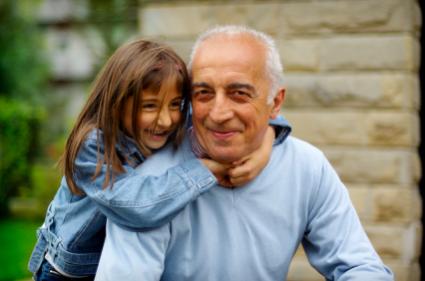By Kim Storey

Bullying prevention expert Kim Storey, EdD, tells us what grandparents need to know about bullying to keep their grandchildren safe.
The Grandparent-Grandchild Relationship
What Grandparents Need to Know About Bullying
Bullying is a serious problem that requires immediate attention and a well thought out response. We know much more about bullying now than when grandparents were children or even parents of young children. Bullying is not just “kids being kids,” and being bullied doesn’t make children stronger. We now know that bullying can have damaging short- and long-term effects. And, through research and best practices, we now have effective strategies for preventing and stopping bullying.
It’s important to understand what bullying is and how to recognize it. Bullying is a form of emotional or physical abuse that has three defining characteristics:
- Deliberate: A bully’s intention is to hurt someone
- Repeated: A bully often targets the same victim again and again
- Power imbalanced: A bully chooses victims he or she perceives as vulnerable
Grandparents may think of the stereotypical bully who uses physical force to steal lunch money or physically harm his or her victim. They may not realize that when another child intentionally and repeatedly uses name-calling or taunting to hurt their grandchild or excludes their grandchild from a social group, this is also considered bullying. Grandparents may also be unaware of a relatively new form of bullying that didn’t exist when they were younger: cyberbullying. (We’ll talk more about cyberbullying later.)
It’s important to know who’s involved in bullying. Grandparents may be concerned that their grandchild could be a victim of bullying. However, they should also realize that their grandchild may be involved in doing the bullying. And even if their grandchild isn’t being bullied or bullying others, he or she may be a bystander. Over the past two decades, we’ve learned more about the important role that bystanders play in bullying, and it is rarely neutral. Bystanders can actively contribute to the bullying by laughing or joining in, they can passively contribute by watching the bullying happen without intervening, or they can help stop the bullying by supporting the victim and getting help.
What Grandparents Can Do to Help a Grandchild Respond to Bullying
If a grandchild comes to a grandparent with a problem about bullying, here are some things that grandparents can do:
- Let their grandchild know that they take bullying seriously. Sympathize, show concern, and ask for more information.
- Determine if the problem is really bullying—has someone intentionally and repeatedly used words, actions, or relationships to hurt their grandchild, and does the situation involve a power imbalance?
-
Ask the grandchild if he or she has told another adult about the situation. If not, grandparents can encourage the child to tell his or her parent(s).
-
If warranted, a parent or grandparent can discuss the situation with the child’s teacher. Teachers may be able to help solve the problem through working with the school’s bullying prevention protocols.
-
Offer effective ways that the child could respond to bullying. For example, role-play how to stay calm and speak up assertively in a bullying situation, and brainstorm a list of trusted friends or adults who could help. The child’s parent or teacher might have other suggestions as well.
-
Make sure that an adult follows up to confirm that the bullying stops.
The best way to stop bullying is to prevent it before it starts. Many grandparents love to tell stories of when they were young. Sharing a story about when a grandparent experienced bullying may encourage a grandchild to share his or her concerns about bullying before it becomes a problem. Grandparents can use these stories to help grandchildren understand that bullying is never acceptable and that there are ways to stop it.
What Grandparents Need to Know About Cyberbullying
Some children take advantage of time with their grandparents to use the computer or other digital devices. Although grandparents may feel intimidated by unfamiliar technology, they don’t need to keep up with the latest tech gadgets to keep their grandchildren safe. Rather, they should pay attention to changes in children’s moods when using these technologies. Grandparents should realize that if a grandchild becomes upset after spending time on the computer or cell phone, he or she may be involved in online bullying, known as cyberbullying.
Grandparents should supervise a grandchild’s use of computers and other digital devices, explain their concerns about cyberbullying, and be prepared to offer advice. If a grandchild is experiencing cyberbullying and the grandparent is concerned for the child’s safety, grandparents should make sure to inform the parents, the school, the local police, the social media site, and/or the service provider.
Working Together to Prevent Bullying
In today’s world, bullying is an all-too-common problem that can happen to any child at any time. Children can benefit from the support of the many caregivers involved in their lives—including their grandparents. When grandparents learn about bullying and how to prevent it, they can be prepared to offer the help and support their grandchildren may need.
Children who are victims need to learn to stand up for themselves and ask for help. Children who watch bullying happen need to know they have the power to stop it. Children who bully need to know that bullying hurts and that bullying is never allowed. When children receive these messages from the many different adults in their lives, including grandparents, they will come to understand that bullying will not be tolerated anywhere, and they will be better equipped to overcome bullying if and when it does occur.
For more information on bullying prevention visit Eyes on Bullying.
Your Turn
We’d like to hear your thoughts. Do you have an experience to share about a grandparent helping a grandchild prevent or stop bullying? Please leave your comments below.*
Don’t miss out—sign up to receive our blog, Promote Prevent Perspectives, in a weekly email!
*E-mail addresses will be kept confidential.